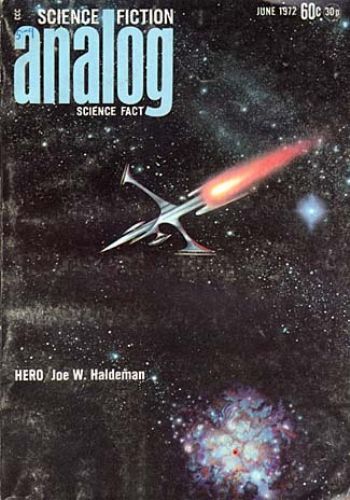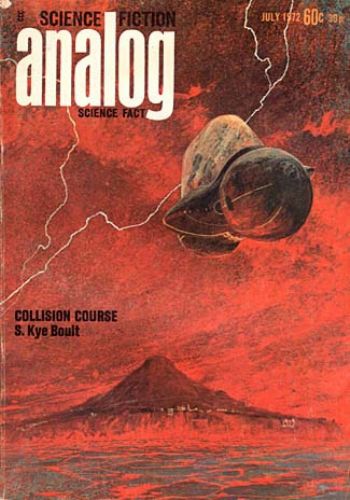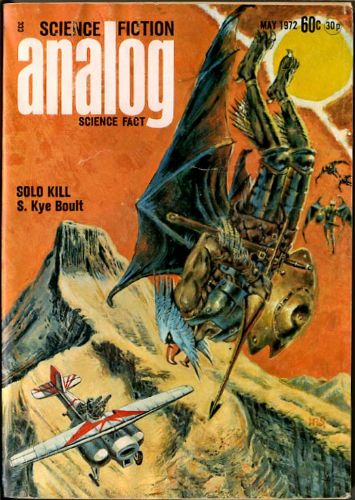ANALOG PLUS 50: Analog Science Fiction/Science Fact, June 1972
Update the photo

June came and went along with the last of the school year and an exess of overtime grading Regents exams. As a result, I fell behind on this blog and have felt too tired to catch up with it along with my math blog. Life happens. I'm back. For now. I'll still be reading even if I'm not posting about it. I don't want to neglect this blog for 4 years, like I did once before.
The June issue of Analog has a noveltte by Joe Haldeman, which was the only name I recognized aside from the serial by Harry Harrison. I'll read that one separately.
For anyone finding these reviews, my purpose is two-fold: enjoying some "classic" sci-fi, and looking for stories that I think could be adapted for TV broadcast since so much of what shows up on anthology shows is rough to awful. Additional Note: I do NOT work in television. I just watch it.
In this issue:
The Editorial: "The Mystic West". Fifty years ago, a war between science and poetry, technology and the arts. Silly but presented sensibly.
Novellette: "Hero", by Joe Haldeman
with an illustration by Kelly Freas, showing several men in spacesuits, armed, running across an alien landscape, at night. There's an explosion in the background., A couple have fallen. The caption reads, With a highly-advanced technology, you'd hardly expect warfare to be anything but push-button automation, right? Wrong! The infantry is still the Queen of Battle, even out among the stars."
Taking place in the far future, 1997, the Earth is an war with the Taurans. No one has seen them yet, and they were given that name because they came from somewhere from the constellation Taurus. The military leaders fought in the last earth war, which took place in Asia in the 1970s. The planet that most of the action takes place on is Charon, which is not the moon of Pluto (not discovered yet). For that matter, Pluto is still a planet and probably larger than we now know it to be. Charon in the story is twice as far out as Pluto is. That's where the training is, and mistakes are death. Also, the only ride home is the go the distance with the mission.
The hard science is understandable for me, but that's also because I'm older and reading more of it. It's moralisti at the end where the Taurans aren't as dangerous in a land battle, but they'll likely be ready for us the next time Earth encounters them.
This could be a good movie or shot TV series. Given that the Expanse does so well, it could try to copy its success. Except that this is much smaller. On the other hand, more open-ended. There's a lot of female representation in the military and the role could be any nationality, so you have diversity. Something worth filming but possibly similar to other things that have already been filmed -- particularly after Hollywood writers get through with it.
Short Story: "Klysterman's Silent Violin", by Michael Rogers, with an illustration by John Schoenherr, showing a simple image of a man in the background playing an electronic violin while wearing a pair of headphones. There's the face of a man in the foreground who appears to be annoyed. I don't know if there's something on his forehead or if it's just a bad image of his hairline. The caption reads, "The path of scientific research sometimes takes unexpected turns -- and so does the path of evolution."
The story is told in the form of journal entries. I just scanned the text looking for the name of the writer, who is in charge. I figured that there might be dialogue in one of them. I didn't see it. Klysterman is a scientist who works on his violin in his spare time. There is a female scientist named Ludmila W., and there appears to be a love triangle. Except that it isn't. Klysterman seems interested in her, and she seems interested in him and his violin. The projet leader tries to separate them -- for her sake, of course, because he's a ne'er-do-well, or something -- going so far as to put her on his research project. It doesn't help.
The narrator becomes more erratic in his tale as it goes on and I thought it was going to be beause of the "silent" violin actually driving him mad. Nope. Doesn't happen and that's a missed opportunity.
Instead the plot resolves around augmented wheat rust, which is allowed to germinate so it could be studied. No, I didn't fully understand the reasons for this. Klysterman takes an interest in the project. It appears that the rust has psychedelic properties. And in the end, the rust's mutations expand so far as to cause a mutation of Klysterman and Lucinda W, which they undergo willingly.
This could be interesting visually but I don't know if it could be done cheaply enough such a short story. It could be the last (short) segment of an hourlong anthology show.
Science Fact: "Strong Poison 2", by arl A. Larson
It was long and I didn't read through much of it. It could have ideas to be used in writing, maybe. I don't recall Strong Poison 1, whenever that was published.
Novellette: "The Darkness to Come", by Robert B. Marcus, Jr.,
with an illustration by John Schoenherr, showing a large black bird-like creature with human-like arms and hands not attached to its wings. The caption reads, In a situation where fats are scarce, faith counts as much as logic. But when the faithful reach the wrong conclusion, they still cling to it stubbornly!
Jans Deriae is an old scientist. He takes pills (which appear to be illegal) to prolong his life. He has calculated that the world (Rangi) is cooling because it is moving away from the primary sun, which would be obviously if the clouds would get out of the way. The population of the world lives underground and most have never seen the sky through gaps in clouds.
Jans Deriae has realized that the world has traveled through the dark of space from one star to another but it has now passed that star. The world won't survive another trip through the darkness.
He's opposed in the scientific community, so none will listen to him, and they ridicule him. He finds a way into Chamber of the Gods, which is off-limits to all. He learns the truth that the "gods" were just men, from a planet called Earth, and they set in motion a plan to save Rangi. But the gods even acknowledged that their machine were fallible and left instructions on what to do if the planet did not enter orbit about the new star on its own. (Diagnostic says that the surface sensors froze.) Now it needs to be fixed before he can be stopped.
An enjoyable story, which could be made with a good budget or an austere one. (Not too austere, make sure they look like bird people, not people with beaks and a few feathers.)
Short Story: "Out, Wit!", by Howard L. Myers, (no initial illustration) The caption reads, As was pointed out long ago, "It ain't what you say, it's the way you that you say it!" that counts.
The story is told in the form of letters between D. R. Dayleman, Editor of the the North American Physical Journal in Virgina and Harmon McGregor, Chairman of the Department of Physics at Grandview University in Ohio. It concerns recommendations of a former student who goes on to make a presentation that includes a joke that is not well-received among his colleagues. He becomes an outcast and the two correspondents are all "woe is me" about it.
As time passes however, science marches on and breakthroughs are made. The chairman is unable to ascertain how he came upon a certain idea, as it doesn't appear in any scientific literature, and assumes that it was just germanating in the back of his mind for a long time. In the end (some ten years later), there's a note about the young man who never amounted to anything in life, going crazy, and they really dodged on, didn't they. Of course, it was the young man's initial idea.
Not only could it be filmed, but it's likely that something of this sort has been. Obviously, there would have to be more than random correspondece. And one would think that the replies to these letters would come much sooner.
I recognized the name, but I couldn't remember from where. The Analytical Library shows that he wrote "War in OUr Time" in March 1972, which I remember had a sequel story a month or two later.
Serial: "A Transatlantic Tunnel, Hurrah!", by Harry Harrison, Part Three of Three.
I'll get to this soon, I hope.
The Reference Library , by P. Schuyler Miller. Reivews include The Lathe of Heaven by Ursula K. LeGuin, A Choice of Gods by Clifford D. Simak, The Devil is Dead by R. A. Lafferty, Russian Science Fiction Literature and Criticism: A Biblioraphy" by Darko Suvin, and Orin by Piers Anthony.
Brass Tacks: Several letters about the illustration of a nude man extending a raised middle finger and the sex that appears in the pages of sci-fi as of later (ie, early 1970s).
I hope I read July's issue before July ends. I also want to read the Harrison serial. On top of this, I seem to have it in my head that I need to keep my daily Kindle reading streak going, and pdf files don't count toward that goal. So other books have to be sprinkled in, even if its only a dozen pages per day.





















